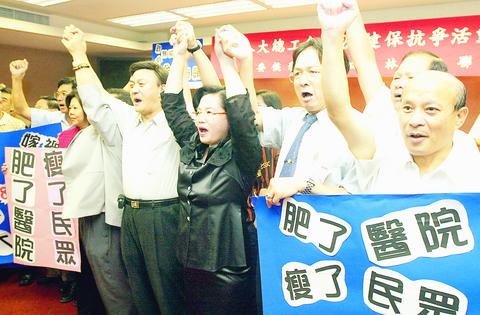Leaders of labor unions yesterday announced that laborers and members of professional groups would take to the streets on Aug. 27 to protest against the government's plan to hike the payments of National Health Insurance (NHI) that go into effect next month.
However, representatives from Taiwan Confederation of Trade Unions (TCTU, 全國產業總工會) said that they have not decided whether to join the demonstration on Aug. 27, saying the TCTU has decided to launch its own protest in front of the Executive Yuan on Aug. 14.
In July, the Department of Health announced a plan to raise the NHI premiums from Sept. 1 to sustain the nation's health-insurance program for two more years.

PHOTO: GEORGE TSORNG, TAIPEI TIMES
Under the scheme, the NHI premiums would be raised from the current 4.25 percent to 4.75 percent of a person's monthly salary and outpatients can expect charges of up to NT$710 per visit at the point of medical treatment.
In a press conference yesterday, PFP lawmaker and the president of the Chinese Federation of Labor (CFL,
"By doing so, we hope that the government can give the plan a second thought before enforcing the fee hike while the economy is slumping and the unemployment rate remains high."
Lin also accused the Cabinet of "deliberately announcing the fee-hike plan when the Legislative Yuan is not in session to evade lawmakers' interference."
Established in 1948, the CFL, Taiwan's largest and oldest federation of trade unions, has more than 3 million members nationwide while the TCTU, established only two years ago, consists of 280,000 members.
The press conference, organized by Lin and KMT lawmaker Hou Tsai-feng (
CFL aims to gather more than 50,000 laborers from around the nation to join the demonstration, during which the protesters will march to the DPP's headquarters, Executive Yuan and the Presidential Office.
During the press conference, however, TCTU General-Secretary Kuo Kuo-wen (郭國文) said, "Since we were not informed of the proposed [Aug. 27] demonstration when CFL and other labor unions prepared for it, we have decided to organize our own protest on Aug. 14."
Huang Jen-wei (黃真瑋), secretary of the CFL, told the Taipei Times that the CFL and the National Labor Union had held their own separate internal meetings to discuss launching individual protests.
"But later we thought it might be better if all major trade unions could jointly demonstrate. That is when we sent out invitations to the other six major labor unions regarding today's press conference," she said.
Kuo also said that the TCTU had not yet decided whether to participate in the demonstration on Aug. 27 because "we have to further discuss whether our stance and opinion toward the hike in NHI fees matches those of the other labor unions."
"TCTU is not totally against the raise in NHI fee and we understand that there is an urgent need to solve the financial problems faced by our NHI program," Kuo said.
"But the government should not threaten the insured with the bankruptcy of the health insurance program to get money from the public."

CHAOS: Iranians took to the streets playing celebratory music after reports of Khamenei’s death on Saturday, while mourners also gathered in Tehran yesterday Iranian Supreme Leader Ayatollah Ali Khamenei was killed in a major attack on Iran launched by Israel and the US, throwing the future of the Islamic republic into doubt and raising the risk of regional instability. Iranian state television and the state-run IRNA news agency announced the 86-year-old’s death early yesterday. US President Donald Trump said it gave Iranians their “greatest chance” to “take back” their country. The announcements came after a joint US and Israeli aerial bombardment that targeted Iranian military and governmental sites. Trump said the “heavy and pinpoint bombing” would continue through the week or as long

TRUST: The KMT said it respected the US’ timing and considerations, and hoped it would continue to honor its commitments to helping Taiwan bolster its defenses and deterrence US President Donald Trump is delaying a multibillion-dollar arms sale to Taiwan to ensure his visit to Beijing is successful, a New York Times report said. The weapons sales package has stalled in the US Department of State, the report said, citing US officials it did not identify. The White House has told agencies not to push forward ahead of Trump’s meeting with Chinese President Xi Jinping (習近平), it said. The two last month held a phone call to discuss trade and geopolitical flashpoints ahead of the summit. Xi raised the Taiwan issue and urged the US to handle arms sales to

State-run CPC Corp, Taiwan (CPC, 台灣中油) yesterday said that it had confirmed on Saturday night with its liquefied natural gas (LNG) and crude oil suppliers that shipments are proceeding as scheduled and that domestic supplies remain unaffected. The CPC yesterday announced the gasoline and diesel prices will rise by NT$0.2 and NT$0.4 per liter, respectively, starting Monday, citing Middle East tensions and blizzards in the eastern United States. CPC also iterated it has been reducing the proportion of crude oil imports from the Middle East and diversifying its supply sources in the past few years in response to geopolitical risks, expanding

Pro-democracy media tycoon Jimmy Lai’s (黎智英) fraud conviction and prison sentence were yesterday overturned by a Hong Kong court, in a surprise legal decision that comes soon after Lai was jailed for 20 years on a separate national security charge. Judges Jeremy Poon (潘兆初), Anthea Pang (彭寶琴) and Derek Pang (彭偉昌) said in the judgement that they allowed the appeal from Lai, and another defendant in the case, to proceed, as a lower court judge had “erred.” “The Court of Appeal gave them leave to appeal against their conviction, allowed their appeals, quashed the convictions and set aside the sentences,” the judges